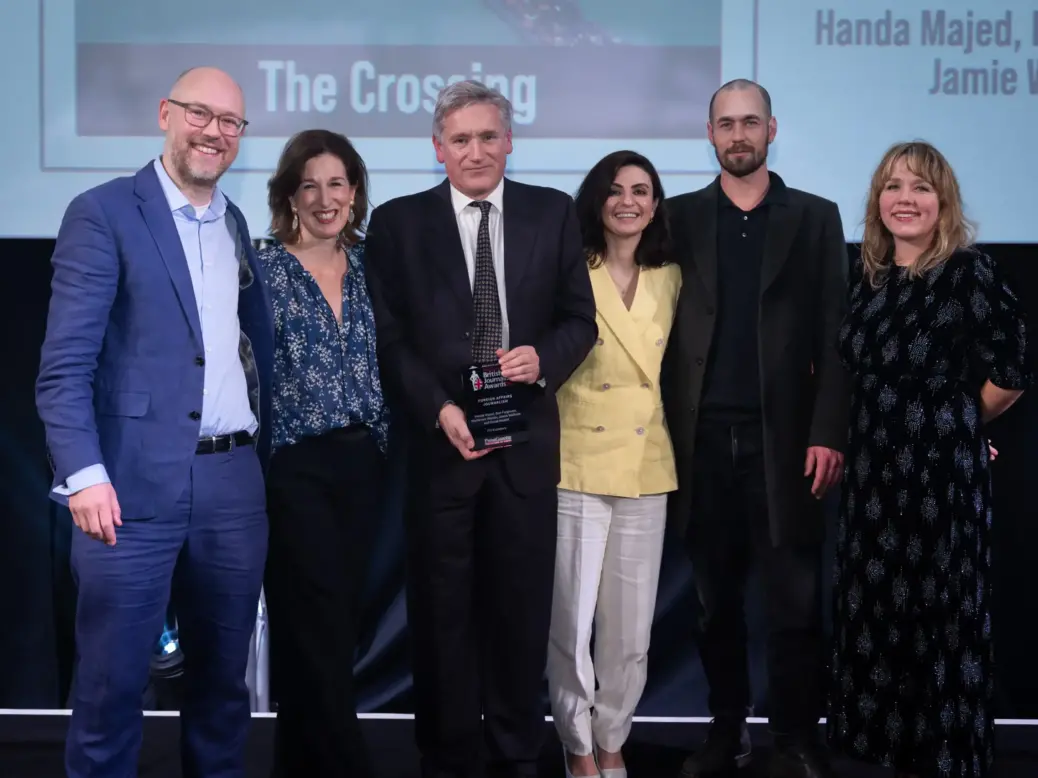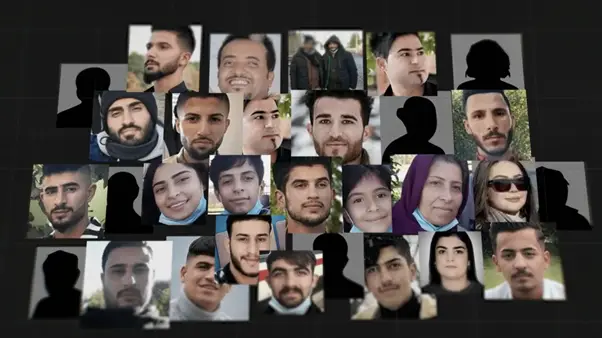
The journalists behind ITV documentary The Crossing have explained how they found sources in the Dunkirk ‘Jungle’ and Kurdistan to give a voice to the victims of the biggest UK maritime disaster of recent years.
Press Gazette spoke to Handa Majed, Nechirvan Mando and Jamie Welham, three of the core team of five who produced the documentary.
The film focuses on the causes and consequences of the capsizing of a dingy packed with asylum seekers in the English Channel in November 2021, which caused 31 deaths.
It traces the journey of those who died, focussing on their experiences with people smugglers and communications with family.
It won the Foreign Affairs award at the British Journalism Awards in December, where judges said: “This was an absolutely immaculate piece of filmmaking providing forensic reconstruction of a historic maritime disaster with powerful testimony from the family of the victims.”
Associate producer Handa Majed, also a former Kurdish refugee, described her role as “the glue between the documentary and the families.”
She said: “As a journalist, you have to explain the good that comes out of the documentary so we focused on how it would help bring closure and a voice to asylum seekers.”
Majed explained how some of the victim’s families were initially reluctant to be interviewed, fearing that they would be exploited and used. Her role was to build trust and explain the purpose of the documentary.
She said: “It’s difficult when you know that someone’s pain is so raw, but you still go in there and open the wound.
“I knew they wanted to do it and it was for a good cause, but it was still painful.”
Majed also worked undercover to locate people-smugglers in the ‘Jungle’ of Dunkirk.
She met with smugglers in broad daylight in the city centre to organise a crossing, highlighting the ease with which the gangs operate.
‘This was the most tragic story I’ve covered’
Like Majed, Nechirvan Mando, the documentary’s Kurdistan producer, has stayed in contact with those he interviewed.
He explained how he initially reached out to the victims’ families: “Finding the contacts in Kurdistan was a bit of luck.
“I knew that in Ranya, a town in Kurdistan, a lot of people travel to the UK so, immediately after the news broke of the deaths, I went there looking for the victims’ families.
“I met one person who said that their brother had crossed the previous night, but he hadn’t heard about his arrival.
“I interviewed him for The Guardian and after a few hours, he discovered that his brother was on the boat which sank.”

This contact provided the details of other family members who also suspected that their loved ones were on the capsized boat, which formed the basis of the documentary’s interviews.
Mando added: “I have covered a lot of wars in Iraq and Syria, and I have seen a lot of horrible things happen to civilians, but this was the most tragic story I’ve covered.
“This is different to a war zone because they send their families to what they think will be a better place.”
‘A director’s job is to make sense of the chaos’
The director, Jamie Welham, explained the process of finding relevant people to interview aside from victim’s families.
Visiting Dunkirk about ten times while producing the documentary, he said that he spoke to anyone who may have had contact with those on the boat in the leadup to the accident.
He said: “A director’s job is to try and make sense of the chaos. There’s so many leads, so much information and so many people and you have to try to identify a thread and way of telling it that pulls it all together in a revealing, emotive and compelling way.
“It was so important because part of humanising them is to make the audience feel like they are travelling in their footsteps, so we wanted to get an accurate picture of their journey.”
Welham reached out to NGOs working in Dunkirk as well as charities and community groups across France and Britain.
He said that his main focus was contacting one of the two survivors for a first-hand account.
One Kurdish survivor had been threatened by the gangs and so refused to speak but the Somali survivor had been traced by a Somali journalist named Bashir Caato, and eventually agreed to speak.
He explained: “We had to do a lot of trust building and reassurance before we were in a place to interview him.
“He was able to confirm the identity of the smugglers which was crucial to the documentary and, ultimately, a smuggler’s arrest.”
When asked about the creative process of documentary journalism, Welham said: “When people think of investigative journalism, it can seem quite detached, so we were constantly thinking about how to give the story a heart.
“I think documentary journalism’s experiencing an interesting moment.
“My sense is that current affairs documentary is in quite good health and is the sort of space, in all the genres of television, where the most interesting and creative work is being made.”
The impact of the documentary was immense. Welham explained: “It had a real-world impact, this film helped move the needle on the public inquiry, it prompted multiple arrests in the UK, France and Iraq and it helped shift public consciousness on small boat crossings.”
The 60 minute documentary was produced by DM Productions for ITV.
ITV Exposure broadcasts films and episodes on domestic and foreign news throughout the year on ITV1 and ITV.
Other awards won by ITV at the latest British Journalism Awards included Tom Bradby’s interview with Prince Harry and the documentary The Clinic which won the Health and Life Sciences Journalism award.
Email pged@pressgazette.co.uk to point out mistakes, provide story tips or send in a letter for publication on our "Letters Page" blog
